Aldi
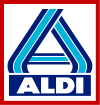 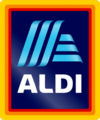 ALDI Nord (left), ALDI Süd (right) | |
| Private | |
| Industry | Retail |
| Founded | 10 July 1946 (split in two parts in 1960, renamed to Aldi Nord and Aldi Süd in 1962)[1] |
| Founders |
Karl Albrecht Theo Albrecht |
| Headquarters |
Essen, Germany (Aldi Nord) Mülheim, Germany (Aldi Süd) |
Number of locations | 10,366 Aldi Nord, Aldi Süd, and Trader Joe's stores |
Area served | Australia, Austria, Belgium, China, Denmark, France, Germany, Hungary, Ireland, Italy, Luxembourg, Netherlands, Poland, Portugal, Slovenia, Spain, Switzerland, United Kingdom, United States |
| Products | Food; Beverage; Sanitary Articles; Household Goods |
| Revenue |
|
| Owner |
Siepmann Foundation, (Aldi Süd) Markus Foundation, (Aldi Nord) |
Number of employees | 104,400 (Aldi Süd, 2015),[3] 58,179 (Aldi Nord, 2015)[4] |
| Subsidiaries | Trader Joe's (Aldi Nord) |
| Website |
www |
Aldi (stylised as ALDI) is the common brand of two German discount supermarket chains with over 10,000 stores in 20 countries, and an estimated combined turnover of more than €50 billion.[1][5][6] Based in Germany, the chain was founded by brothers Karl and Theo Albrecht in 1946 when they took over their mother's store in Essen, which had been in operation since 1913. The business was split into two separate groups in 1960, that later became Aldi Nord, headquartered in Essen, and Aldi Süd, headquartered in Mülheim.[7][8] In 1962, they introduced the name Aldi (a syllabic abbreviation for Albrecht Diskont),[9] which is pronounced [ˈaldiː] (![]()
Aldi's German operations consist of Aldi Nord's 35 individual regional companies with about 2,500 stores in western, northern, and eastern Germany, and Aldi Süd's 32 regional companies with 1,600 stores in western and southern Germany.[10] Internationally, Aldi Nord operates in Denmark, France, the Benelux countries, Portugal, Spain and Poland, while Aldi Süd operates in Ireland, Great Britain, Hungary, Switzerland, Australia, China, Italy, Austria and Slovenia. Both Aldi Nord and Aldi Süd also operate in the United States with 1,600 stores as of 2017.[11]
History
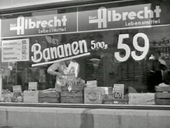
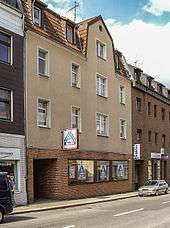
The earliest roots of the company trace back to 1913, when the mother of Karl and Theo Albrecht opened a small store in a suburb of Essen.[11] Their father was employed as a miner and later as a baker's assistant. Karl Albrecht was born in 1920, Theo Albrecht in 1922. Theo Albrecht completed an apprenticeship in his mother's store, while Karl Albrecht worked in a delicatessen.
Karl Albrecht took over a food shop formerly run by F. W. Judt who already advertised that they were the "cheapest food source". Karl Albrecht served in the German Army during World War II. In 1946, the brothers took over their mother's business and soon opened another retail outlet nearby.[11] By 1950, the Albrecht brothers owned 13 stores in the Ruhr Valley.[12]
The brothers' idea, which was new at the time, was to subtract the legal maximum rebate of 3% before sale. The market leaders at the time, which often were co-operatives, required their customers to collect rebate stamps, and to send them at regular intervals to reclaim their money. The Albrecht brothers also rigorously removed merchandise that did not sell from their shelves, cutting costs by neither advertising nor selling fresh produce, and keeping the size of their retail outlets small.[11]
When the brothers split the company in 1960 over a dispute whether they should sell cigarettes,[13] they owned 300 shops with a cash flow of DM90 million yearly. In 1962, they introduced the name Aldi—short for Albrecht-Diskont. Aldi Nord and Aldi Süd have been financially and legally separate since 1966, although both divisions' names may appear as if they were a single enterprise with certain store brands or when negotiating with contractor companies.
The individual groups were originally owned and managed jointly by the brothers. Karl Albrecht, who died in 2014, retained ownership of Aldi Süd with a personal wealth of €17.2 billion that made him the richest man in Germany. The co-owners of Aldi Nord, Berthold and Theo Albrecht Jr. came close behind at €16 billion. Dieter Schwarz, owner of Lidl and Kaufland came in third, with a fortune of €11.5 billion.[14]
Aldi started to expand internationally in 1967, when Aldi Süd acquired the grocery chain Hofer in Austria;[15] Aldi Nord opened its first stores abroad in the Netherlands in 1973,[16] and other countries followed. In 1976, Aldi opened its first store in the United States in Iowa,[lower-alpha 1] and, in 1979, Aldi Nord acquired Trader Joe's.[11] After German reunification and the fall of the Iron Curtain, Aldi experienced a rapid expansion. The brothers retired as CEOs in 1993; control of the companies was placed in the hands of private family foundations, the Siepmann Foundation (Aldi Süd) and the Markus Foundation (Aldi Nord, Trader Joe's).[6]
Business organization
Germany
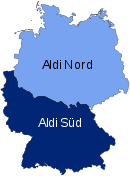
The Aldi Nord group currently consists of 35 independent regional branches with approximately 2,500 stores. Aldi Süd is made up of 31 companies with 1,600 stores. The border between their territories is commonly known as ″Aldi-Äquator″ (literally: Aldi equator)[18][19] and runs from the Rhine via Mülheim an der Ruhr, Wermelskirchen, Marburg, Siegen, and Gießen east to just north of Fulda.
The former East Germany is served by Aldi Nord, except for one Aldi Süd in Sonneberg, Thuringia, whose regional office is in Bavaria. The regional branches are organised as limited partnerships with a regional manager for each branch who reports directly to the head office in Essen (Aldi Nord) or Mülheim an der Ruhr (Aldi Süd).
In December 2002, a survey conducted by the German market research institute Forsa found 95% of blue-collar workers, 88% of white-collar workers, 84% of public servants, and 80% of self-employed Germans shop at Aldi.[20] One of Aldi's direct competitors internationally is Lidl.
Internationally
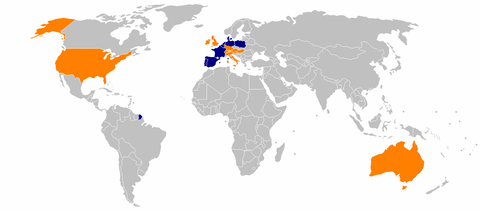
The Aldi group operates over 8,000 stores worldwide. Aldi Nord is responsible for its stores in Belgium, the Netherlands, Luxembourg, France, Poland, Spain, Denmark, and Portugal, and also operates the Trader Joe's markets in the United States. Aldi Süd's responsibilities are in the United States (operating under the Aldi name), Austria, Slovenia and Italy (as Hofer), Great Britain, Ireland, Australia, and Switzerland. Aldi Süd's first Switzerland store opened in 2005, while it has operated in Hungary since 2007. Aldi Süd had invested an estimated €800m ($1bn; £670m) in Greece from November 2008 until pulling out on 31 December 2010.[21]
While Aldi Nord has renamed its Dutch and Belgian subsidiaries Combi and Lansa to the Aldi Markt/Aldi Marché brand, Aldi Süd tries to maintain a regional appearance, branding its stores Aldi Süd in Germany, Aldi Suisse in Switzerland, and Hofer in Austria and Slovenia.[22]

_001.jpg)
Aldi launched in Great Britain, on 5 April 1990, when it opened its first store there in Stechford, Birmingham, using the wholly owned English registered company of Aldi Stores Limited and Aldi sales in Britain grew consistently. In October 2013, Aldi opened the 300th store in Great Britain.[23] By 2017 Aldi had over 600 stores there, and was opening them at a rate of more than one a week with the aim of having a thousand stores by 2022.[24]
It was still a small player in Great Britain, with a grocery share of less than 3.6%, but its importance, along with that of continental no-frills competitor Lidl was growing, with half of shoppers in Great Britain visiting Lidl or Aldi over Christmas that year. Aldi opened stores in affluent locations, including Knutsford and Bury St Edmunds.[25]
In much of Australia, Aldi filled a void in the discount supermarket business that arose when the discount grocery chain Franklins went out of business. Aldi opened its first store in Sydney, 2001 and has grown rapidly since, maintaining a 12.6% market share as of early 2016.[26][27]
Aldi Süd expanded to the United States under the Aldi banner, having expanded throughout the Eastern and Midwestern U.S., mostly through organic expansion, though it did buy Bottom Dollar Food in late 2014 from Delhaize Group.[28] Aldi Süd revealed expansion plans in 2015 and expanded into the Southern California market, where Aldi Nord's Trader Joe's is based.[29] On 25 November 2016 Aldi Süd confirmed that it will expand to China in late 2017.[30]
Hofer, subsidiary of Aldi Süd, opened its first 10 stores in Italy on 1 March 2018.[31]


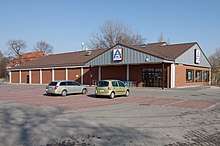
Geographic distribution
| Country | Name | Aldi group | Since | Outlets |
|---|---|---|---|---|
| Aldi | Nord | 1961[9] | 2,298[32] | |
| Aldi | Süd | 1962[33] | 1,880[33] | |
| Aldi | Süd | 2001 | 514[34] | |
| Hofer | Süd | 1968 | 493[33] | |
| Aldi | Nord | 1973 | 457 | |
| Aldi | Nord | 1977 | 222 | |
| Aldi Marché | Nord | 1988 | 891 | |
| Aldi | Süd | 2008 | 136 [35] | |
| Aldi | Süd | 1999 | 133[36] | |
| Aldi | Süd | 2018 | 40[37] | |
| Aldi | Nord | 1990 | 15 | |
| Aldi | Nord | 1975 | 491 | |
| Aldi | Nord | 2008 | 124[38] | |
| Aldi | Nord | 2006 | 60 | |
| Hofer | Süd | 2005 | 93 | |
| Aldi | Nord | 2002 | 264[39] | |
| Aldi Suisse | Süd | 2005 | 193[33] | |
| Aldi UK | Süd | 1990 | 775[40][41][42][43] | |
| Aldi US | Süd | 1976 | 1,815[44][45][46] | |
| Trader Joe's | Nord | 1979 | 474[47] | |
| total number of Aldi Nord stores | 5,293 | |||
| total number of Aldi Süd stores | 5,941 | |||
| combined total of Aldi stores | 11,234 | |||
Business practices
Some Aldi practices are common in German supermarkets but largely unique to Aldi in other countries. These include the system of metal gates and turnstiles forcing customers to exit through the checkout, and charging customers for shopping bags. Until 2004, Aldi stores accepted only cash (since then, German stores have accepted domestic Girocard debit cards). Debit cards also are accepted in the United States, Great Britain, Austria, Belgium, Denmark, France, Portugal, Spain, the Netherlands, Switzerland, Ireland, Australia, Slovenia, and Hungary. All 4 major credit cards are accepted in the United States as of 1 March 2016. Electronic Benefit Transfer cards are also accepted in the United States.[48]
Outside of Great Britain, United States and France, Aldi generally does not accept credit cards, though Aldi Australia accepts MasterCard and Visa for a 0.5% surcharge and Aldi Ireland accepts Visa and MasterCard with no surcharge. In the United States, as of February 2016, Aldi accepts all four major credit cards (MasterCard, Visa, American Express and Discover Card), and from the beginning all credit cards "Carte Bleue" (Visa, American Express or MasterCard) in France due to the banking system in France where debit cards don't exist; before this, Aldi only accepted debit cards. Aldi has accepted Visa/MasterCard without surcharge throughout Great Britain from October 2014, which had previously been accepted only in Scotland,[49] and throughout Germany from September 2015.[50][51][52]
Aldi Suisse became one of the first companies to accept the Apple Pay contactless payment system in Switzerland on 7 July 2016.[53][54]
On 9 August 2018, Aldi announced plans to expand its product selection by offering more organic, fresh and easy-to-prepare meals. Aldi also aims to expand to about 2,500 stores in the United States by 2022.[55][56]
On 18 September 2018, Aldi announced its intent to offer grocery delivery in the United States. Aldi began testing grocery delivery in 2017 in select cities such as Atlanta, Georgia and Chicago, Illinois.[57] Grocery delivery is expected to be available nationwide by Thanksgiving 2018.[58]
In-store layout

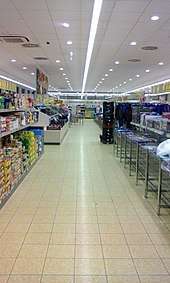
Aldi stores are noted as examples of so-called no-frills stores that often display a variety of items at discount prices, specializing in staple items, such as food, beverages, toilet paper, sanitary articles, and other inexpensive household items. Many of its products are own brands, with the number of other brands usually limited to a maximum of two for a given item. This increases sales for each article, and lets Aldi shops be smaller than stores with more brand choice. This practice let Aldi avoid price tags, even before the introduction of barcode scanners. On many of its own brands, if feasible, Aldi will place multiple barcodes on products to speed the check out process.
Aldi mainly sells exclusively produced, custom-branded products (often very similar to and produced by major brands[59]) with brand names including Grandessa and Fit & Active.
Branded products carried include HARIBO in Germany, Knoppers in Belgium and France, Marmite and Branston Pickle in Great Britain; and Vegemite and Milo in Australia. In the United States, major brand-name products, such as Oscar Mayer bacon, sometimes are offered as a 'special purchase': name-brand items that Aldi has received at a special price from the vendor and can offer for a reduced price. Unlike most shops, Aldi does not accept manufacturers' coupons, although some US stores successfully experimented with store coupons (e.g. $10 off a $25 purchase).
In addition to its standard assortment, Aldi has weekly special offers,[60] some of them on more expensive products such as electronics, tools, appliances, or computers, usually from in-house electronics brand Medion and workzone[61] brand for tools. Discount items can include clothing, toys, flowers, and gifts. Specials have strict limits on quantities, and are for one week. Aldi's early computer offers in Germany (such as a Commodore 64 in 1987) resulted in those products selling out in a few hours.[62]
Aldi is the largest wine retailer in Germany.[63] Some Australian stores now sell alcoholic beverages. Some US stores also sell alcoholic beverages (mainly beer and wine) where permitted by local and state laws.
Advertising policy
Aldi has a policy in Germany of not advertising, apart from a weekly newsletter of special prices called "Aldi informs" that is distributed in stores and by direct mail and often printed in local newspapers. It claims this is a cost saving that can be passed on to consumers. In Germany, Aldi has never used an external advertising agency.[20]
In the United States, it advertises in newspapers and on television, as well as print ads distributed in stores, and via the Internet.
In Great Britain, print and television ads have appeared since May 2005.
In Australia, television advertising is common and the current ads are listed on the Australian website.[64]
In Belgium, print, radio and television ads started appearing in late 2017. These ads were based on the positive results of taste-tests where the chain pitted its own products against common name-brand products.
Logos and branding
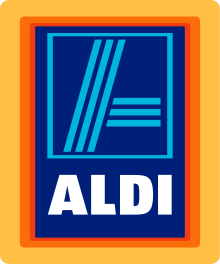
The two stores Nord and Süd have distinct logos with Nord displaying the entire 'A' for ALDI while Süd unveiled a logo in 1982 which displays only half. In 2006, Aldi Süd modified the logo slightly and then in March 2017, unveiled a new logo which removed the blue box line around the artistic 'A' and revealed a more rounded, 3D look for the logo as well as a new font for the word 'ALDI', further differentiating it from the Aldi Nord logo which had shared the same font for the brand until then.[65][66]
Reputation
Originally, Aldi shops were often ridiculed as being cheap shops selling low-quality goods, whose customers could not afford to shop elsewhere.[67]
In the United Kingdom, Aldi has won Supermarket of the Year two years in a row (2012/13),[68] and in 2013, Aldi won the Grocer of the Year Award.[69] However, in February 2015, Aldi narrowly lost to Waitrose for the title of Supermarket of the Year 2015. In April 2015, Aldi overtook Waitrose to become the United Kingdom's sixth-largest supermarket chain.[70] In February 2017, Aldi overtook Co-op to become the United Kingdom's fifth largest supermarket chain.[71]
In the United States, due to the relatively low staffing of Aldi locations compared to other supermarket chains, Aldi has a reputation of starting employees out at significantly higher than minimum wage, unusual among American supermarkets.[72][73]
In Ireland, Aldi has been accused of a "lack of corporate responsibility" to their farmer suppliers by the Irish Farmers' Association.[74]
Aldi was named 2018 "Retailer of the Year" by Supermarket News.[75]
Subsidiaries and joint ventures
Aldi Talk
Aldi has a mobile virtual network operator in Germany, Belgium and the Netherlands, called Aldi Talk. Aldi also operates a similar network in Australia using Telstra's 4G network, called Aldimobile.[76]
Its Austrian and Slovenian Hofer stores serve as distributor for HoT (Hofer Telekom).
Aldi Liquor
Aldi sells low cost liquor from its liquor stores. Until March 2016, Aldi had a liquor website serving the east coast of Australia. This has now been closed down, citing it wishes to focus on expanding the supermarket chain across Australia.
Diskont
In Austria and Slovenia through its subsidiary Hofer, Aldi has a joint venture with the local petrol retailer Free Energy (FE) Trading GmbH, to create some no frills petrol stations called Diskont.[77] The 66 stations in Austria and 6 in Slovenia are on or nearby the stores, providing self-serve unleaded or diesel fuel by card-operated pumps. These have been in operation since 2009.
Notes
- ↑ Aldi purchased the Iowa's Benner Tea chain and opened its first United States store at Burlington in 1976.[17]
References
- 1 2 Thomas Rudolph (1 October 2011). Diversity in European Marketing: Text and Cases. Springer Science & Business Media. p. 141.
- ↑ "Obituary: Theo Albrecht."
- ↑ Schlosser, Gianna. "Aldi gibt erstmals Einblicke in Zahlen und Konzernpolitik".
- ↑ "Unternehmensgruppe ALDI Nord Nachhaltigkeitsbericht 2015 – Kennzahlen & Standards".
- ↑ "Working for Aldi". aldi. Archived from the original on 22 August 2014.
- 1 2 Stefan Wagstyl (21 July 2014). "Karl Albrecht, Aldi co-founder, 1920-2014". The Financial Times.
- ↑ "Impressum" ALDI Nord. Retrieved on 14 February 2011. "ALDI Einkauf GmbH & Co. oHG Eckenbergstraße 16 45307 Essen."
- ↑ "Impressum Archived 23 March 2013 at the Wayback Machine.." Aldi Süd. Retrieved on 14 February 2011. "Burgstraße 37 45476 Mülheim an der Ruhr Amtsgericht Duisburg HRA 8577."
- 1 2 http://www.aldi-nord.de/aldi_ueber_uns_814.html Retrieved on 22 February 2014.
- ↑ "ALDI BUSINESS MODEL | HOW DOES ALDI MAKE MONEY | STRATEGY AND INSIGHTS - Vizologi | rethinking business model design". Vizologi | rethinking business model design. 13 December 2017. Retrieved 5 July 2018.
- 1 2 3 4 5 Weymouth, Lauren. "Secrets of the German supermarkets conquering America (24 slides)". MSN: Money. Retrieved 7 September 2017.
- ↑ "Aldi: the incredible story of the German supermarket taking over the world | lovemoney.com". www.lovemoney.com. Retrieved 5 July 2018.
- ↑ Graham Ruddick (7 December 2012). "Billionaire Aldi heir Berthold Albrecht dies at 58". the Telegraph.
- ↑ Aldi dynasty continue to lead German rich list.Published: 10 October 2011
- ↑ "Aldi Süd - About Aldi Süd(German)". Archived from the original on 29 October 2014.
- ↑ "Aldi Nord - About us(German)".
- ↑ Johnson, Patt (10 September 2015). "Aldi to open Windsor Heights store". The Register and Tribune. Des Moines. Retrieved 7 September 2017.
- ↑ Hielscher, Henryk (28 July 2014). "Sieben Leitsätze : Der Aldi-Äquator trennt das Land" (in German). Wirtschaftswoche. Retrieved 1 January 2015.
- ↑ Wilkes, Christoph; Wilkes, Johannes (2012). Der Aldi-Äquator: 4 Jungs, 20 Filialen, 660 Kilometer [The Aldi equator: 4 guys, 20 stores, 660 kilometer] (in German). Fischer Taschenbuch Verlag. ISBN 978-3-596-19471-1.
- 1 2 Steinhoff, Jürgen; Helga Hein; Ingrid Lorbach (16 December 2002). "Hinter den Kulissen des Discounters". Stern (in German). Archived from the original on 26 August 2012. Retrieved 4 August 2010.
- ↑ "Aldi quits Greece" (in German). www.german-retail-blog.com. 23 July 2010. Retrieved 18 February 2012.
- ↑ Hofer. "Hofer - Start". Retrieved 29 October 2014.
- ↑ Yeomans, Jon. "Aldi, Lidl, and Waitrose seize share as market polarises". Thegrocer.co.uk. Retrieved 29 January 2014.
- ↑ Simpson, Emma (26 September 2017). "The man driving Aldi's remarkable growth". BBC News. Retrieved 27 September 2017.
- ↑ "BBC News – Graduate jobs: The hunters and the hunted". bbc.co.uk. 6 July 2010. Retrieved 29 January 2014.
- ↑ Aldi arrives in Australia, ABC Online, 25 January 2001
- ↑ Mike King, ALDI is stealing market share from Woolworths Limited, The Motley Fool, 15 April 2016
- ↑ Delhaize Group to Sell 66 Bottom Dollar Food Store Locations, MarketWatch, 5 November 2014
- ↑ Kelly Taylor, Aldi To Open 45 Stores In Southern California By 2016, Fox LA.
- ↑ Jahshan, Elias (25 November 2016). "Aldi confirms China expansion - Retail Gazette".
- ↑ "Aldi sbarca in Italia". Today.it. 24 February 2018.
- ↑ [Aldi Nord Sustainability Report 2015) https://www.cr-aldinord.com/2015/wp-content/uploads/sites/2/2016/04/ALDI_North_Group_NHB_Sustainability_Report_2015.pdf] access: 25 September 2016.
- 1 2 3 4 "Aldi Süd Facts and Figures". Archived from the original on 22 December 2008. Retrieved 6 December 2008.
- ↑ ALDI. "Find your Local ALDI Store - ALDI Australia". storelocator.aldi.com.au. Retrieved 13 January 2017.
- ↑ "Aldi stores in Hungary".
- ↑ "Aldi eyes four new Irish stores by end of the year". Retrieved 2 October 2018.
- ↑ "ALDI - Punti vendita e orari d'apertura". Retrieved 10 September 2018.
- ↑ Aldi "10 lat w Polsce" gazetka promocyjna od 26-02 do 04-03-2018. (in Polish)
- ↑ "Los Supermercados Aldi más próximos". Retrieved 7 April 2016.
- ↑ Food and Drink (29 October 2013). "How Aldi won the class war – and became the fastest-growing supermarket in Britain". London: Telegraph. Retrieved 7 December 2014.
- ↑ "Aldi Stores UK". Aldi Stores Limited. Retrieved 16 November 2016.
- ↑ The Sun (26 September 2017). "Aldi to open more than 70 more UK stores after £8.7bn record sales". The Sun. Retrieved 26 September 2017.
- ↑ The Guardian (4 January 2018). "Aldi gives pay rise after UK sales exceed £10bn for first time". The Guardian. Retrieved 4 January 2018.
- ↑ ALDI Honored with Retailer of the Year and Product of the Year Wins. 12 February 2014.
- ↑ . 3 January 2018.
- ↑ "ALDI US - Store Locator". aldi.us.
- ↑ "Where in the dickens you can find a Trader Joe's?" (PDF). Trader Joe's. April 2014. Retrieved 13 May 2014.
- ↑ "ALDI US - FAQs". Retrieved 21 March 2015.
- ↑ "Aldi: Credit and Bank Cards now accepted". Retrieved 14 November 2014.
- ↑ "ALDI Nord website". Retrieved 8 October 2015.
- ↑ "ALDI Süd website". Archived from the original on 18 October 2015. Retrieved 8 October 2015.
- ↑ "Press release: Aldi to take credit cards" (PDF). Archived from the original (PDF) on 18 October 2015. Retrieved 8 October 2015.
- ↑ "Apple Pay ist ab sofort verfügbar in der Schweiz — macprime.ch News". www.macprime.ch. Retrieved 7 July 2016.
- ↑ Apple cranks up heat on PayPal by finally bringing Apple Pay to websites Digital Trends
- ↑ "Aldi Is Expanding in the U.S. With These New Products". Fortune. Retrieved 2018-09-24.
- ↑ "Aldi kicks off major product expansion". Supermarket News. 2018-08-09. Retrieved 2018-09-24.
- ↑ "Aldi is rolling out grocery delivery across the US in a direct assault against Walmart, Amazon, and Kroger". Business Insider. Retrieved 22 September 2018.
- ↑ "ALDI bringing home delivery to St. Louis". www.bizjournals.com. Retrieved 2018-09-22.
- ↑ A list of no-name brands and the major brand companies behind them for Germany. Aldi relies on re-labeled major brand products.
- ↑ "Aldi special buys this week are set to be a game changer". Ideal Home. 26 October 2017. Retrieved 28 October 2017.
- ↑ ALDI. "ALDI US - WORKZONE". www.aldi.us. Retrieved 28 October 2017.
- ↑ "HCM: The Home Computer Museum". Retrieved 9 February 2007.
- ↑ "GERMANY: Aldi is the biggest wine retailer in Germany". Progressive Newsletter 79. Progressive Group International Newsletter. 20–26 March 2006. Archived from the original on 6 March 2012. Retrieved 18 February 2012.
- ↑ ALDI. "TV Advertising & Commercials - ALDI Australia".
- ↑ "Discount Ribbon". Brand New.
- ↑ "Aldi 'modernizes' logo to match store changes". Supermarket News. 20 March 2017. Retrieved 24 July 2017.
- ↑ Waltraud Schwab (19 June 2010). "Arme Discounterkunden: Kasse dank Masse" (in German). Die Tageszeitung. Retrieved 18 February 2012.
- ↑ "Aldi wins Supermarket of the Year at Which? awards for second year in a row".
- ↑ "Aldi scoops Grocer of the Year Award at Grocer Golds".
- ↑ "Aldi overtakes Waitrose to become UK's sixth-largest supermarket chain".
- ↑ "Aldi overtakes Co-op to become UK's fifth largest grocer". 7 February 2017 – via www.bbc.co.uk.
- ↑ "Working at Aldi – Reviews of Jobs at Aldi". Jobitorial.com. Retrieved 29 January 2014.
- ↑ "Aldi, Inc. Employer Wages, Hourly Wage Rate". PayScale. 3 January 2014. Retrieved 29 January 2014.
- ↑ "IFA hold protest outside Aldi's Letterkenny store over beef prices". 19 September 2014. Retrieved 19 September 2014.
- ↑ Sentinel, Doreen Christensen Sun. "Aldi named 2018 retailer of year". Finger Lakes Times. Retrieved 2018-10-10.
- ↑ Sharma, Krishan (5 March 2013). "List of Aldi and Kogan's budget phone plans". BIT. Haymarket Media. Retrieved 9 March 2013.
- ↑ "Diskont homepage". FE-Trading GmbH. Retrieved 26 October 2014.
External links
| Wikimedia Commons has media related to Aldi. |